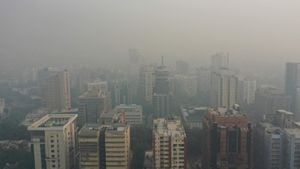A significant tragedy unfolded at the Maharani Laxmi Bai Medical College's neonatal intensive care unit (NICU) in Jhansi, resulting in the heartbreaking death of infants during and after a devastating fire. The fire occurred on the night of November 15th, claiming the lives of 11 newborns, including one infant who had been rescued just days prior.
Initially, the incident raised immediate concerns over safety protocols, as the NICU was reportedly overwhelmed, housing 49 infants against its standard capacity of just 18. Eyewitness accounts described chaos and panic as hospital staff and families scrambled to rescue the infants.
The cause of the fire, according to preliminary investigations, has been attributed to electrical overload, triggering sparks from equipment, likely involving oxygen concentrators. The Jhansi District Magistrate, Avinash Kumar, informed the media about the investigations, which are being closely monitored. “The details are still being verified and cross-checked,” he noted.
Among the victims, one heartbreaking story emerged: Yakoob Mansuri, who tragically lost his twin daughters but managed to save others during the inferno. “It’s unbearable. I saved six children but couldn’t save my own,” he lamented through tears, representing the countless heart-wrenching tales of loss arising from this unfortunate event.
The horrific aftermath revealed the extent of the disaster, with reports indicating some of the deceased infants were burned beyond recognition. Autopsies conducted revealed the shocking condition of the bodies, with many suffering severe burns and damage. DNA samples were taken to help identify the infants, providing the devastated families with some form of closure amid their grief.
Simultaneously, the state government initiated investigations at multiple levels, acknowledging the catastrophe's demands for answers. Deputy Chief Minister Brajesh Pathak visited the hospital the day after the fire, emphasizing the importance of accountability. “We must avoid such gross negligence moving forward,” he stated.
On the ground, parents became entangled in their own tragedies, echoing emotional pleas for the health of their children as some were shifted to different wards and hospitals. Bhola Singh, father of one of the premature infants admitted to the NICU, shared his distressing experience after losing his child, stating: “The doctors were moving him to the children’s ward, and then they said he didn’t make it. What am I supposed to think?” His anguish echoed throughout the hospital as parents awaited news of their newborns caught up in the crisis.
This incident has shone a severe light on the state's healthcare system, raising urgent calls from the public and opposition parties alike for thorough reforms. Many demanded adherence to safety protocols and the provision of adequate facilities to prevent overcrowding and unsafe conditions, reflecting systemic failures throughout various healthcare facilities.
Dr. N.S. Sengar, the principal of the medical college, addressed these issues as well, admitting to having shared his concerns about overcrowded units. At the same time, he highlighted the hospital’s strained infrastructure, which has struggled to cope with increasing patient intake.
The fire incident also raised questions about the effective administration of safety equipment and procedures, with families demanding accountability from the authorities. “Every piece of machinery should have been rigorously monitored,” complained one bereaved mother, expressing the frustrations of many families laying blame directly on the setup of the hospital. “This was negligence. We shouldn’t have lost our babies.”
Emergency services and law enforcement have also been brought under scrutiny following the tragedy. Authorities revealed they are investigating claims made by families, including one desperate report from Kripa Ram, whose infant allegedly went missing amid the chaos of evacuation. Following this, hospital staff, along with police, were deployed to locate the child, emphasizing the chaos and disarray ensuing from the initial response.
With online petitions and gatherings forming among communities, voices of the affected families have been amplified as calls for justice have taken to the streets. “We must hold them accountable,” said Asha Ram, Kripa's brother, who has been distraught since he last saw his nephew amid the smog of smoke and the ashes of despair.
Local leaders have urged government intervention to revamp hospital safety standards to prevent such catastrophic episodes from reoccurring. “What we need now is action—a guarantee of safety for our future children,” one local politician declared during a press conference.
This is just the beginning of what promises to be extensive and grueling investigations, as both families and citizens alike are seeking answers and accountability, yearning for justice for the lives lost too soon and the safety of the precious newborns still under care.
Despite hundreds of heartaches intertwined with indiscriminate loss, the communal spirit and calls for change resonate loudly as they press forward toward accountability and healing. While some families mourn, others have begun pressing policymakers for assurance, knowing their fight should extend beyond the immediate past but for the future generations reliant on healthcare systems to provide nurturing care.



